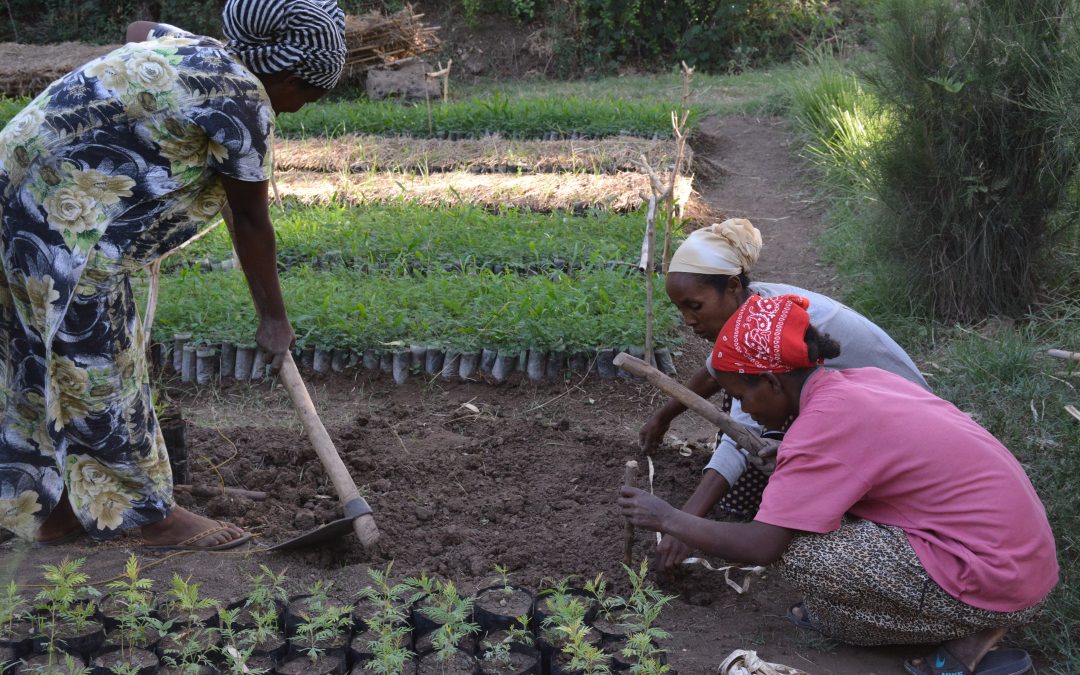By Mieke Bourne, Sabrina Chesterman, Constance Neely and May Muthuri
The most recent Regreening Africa Joint Reflection and Learning Missions (JRLMs) were designed using the SHARED (Stakeholder Approach to Risk Informed and Evidence-based Decision-making) method. The result was an innovative monitoring, reflection and co-learning opportunity between all project partners, across seven countries.
Imagine the power of deliberate pause and reflect moments, no matter the size of the project. Think of the strength of dynamic and collaborative teams coming together to gather on-the-ground data and analysing it reflectively, even across an eight-country programme. Consider the knowledge that could be generated, the in-context insights gained, lessons shared, and best practices gleaned for broader application.
Well, the SHARED Decision Hub developed an innovative design that made these a reality. Exceptional facilitation of the missions harnessed such power and strength that comes from collaborative learning and adaptive planning.
The uniquely designed JRLMs provided the opportunity for World Agroforestry (ICRAF) scientists, project managers, implementing NGOs, National Oversight Coordination Committee (NOCC) members, and farmers to jointly query and learn from one another’s evidence and experience in safe spaces, both on farms and in meeting rooms. It was also a chance to build on project momentum and consider actions to improve the scaling strategies.
The big regreening project
By 2022, Regreening Africa aims to improve livelihoods, food security, and resilience to climate change of smallholder farmers by restoring ecosystems, particularly through agroforestry. It’s a five-year project funded by the European Union that seeks to reverse land degradation among 500,000 households, and across 1 million hectares in eight countries in sub-Saharan Africa.
The first aim of Regreening Africa is to scale-up evergreen agriculture using locally appropriate land restoration techniques including farmer-managed natural regeneration, tree planting and other forms of agroforestry. Secondly, the programme focuses on strategic decision making for scaling which entails working across the eight countries to collect and apply evidence in multi-stakeholder engagement and policy processes. Through these initiatives and technical advisory, the programme aims to equip Ethiopia, Ghana, Kenya, Mali, Niger, Rwanda, Somaliland/Puntland and Senegal with the surveillance and analytical tools for land degradation that support strategic decision-making and monitoring.
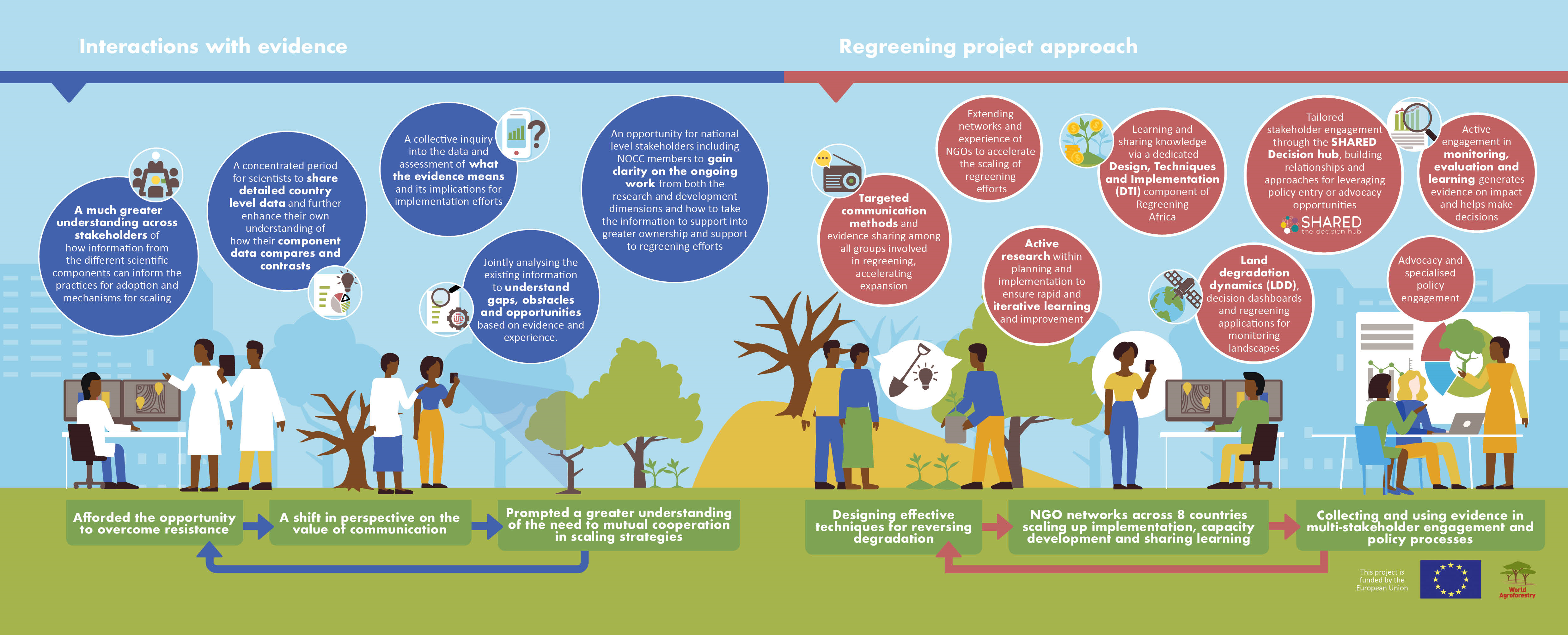
Regreening Africa Project approach
With these programme objectives in mind, the week-long JRLMs provided a platform for mutual learning on what was working and that which could be improved in terms of implementation. Reviewing evidence from scientific studies and field experiences encouraged discussions around technical, managerial and behavioural obstacles. As a result, agreements on concrete actions were included in activity plans and budgets for the third year of the project, to increase uptake of restoration practices that transform landscapes.
Sharing the knowledge
Starting off the missions were two to three-day on-farm field visits to project locations to see work underway, understand key challenges faced by the community and identify practices or catalytic actions that could be developed further to accelerate scaling to meet regional goals. Interaction with farmers and their respective leaders was key.
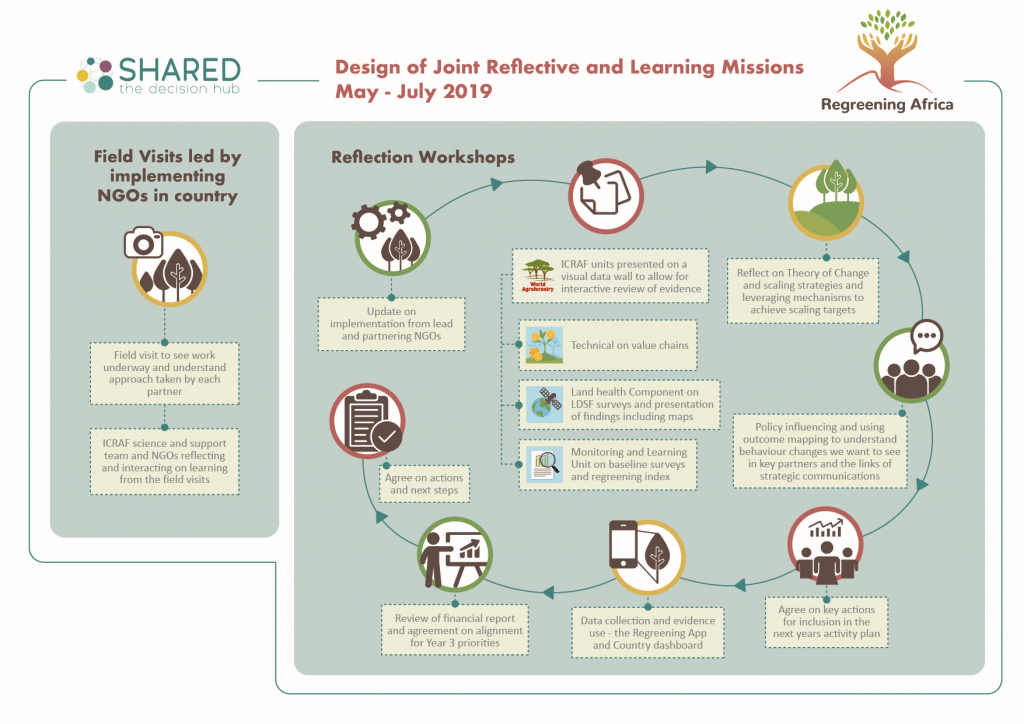
Two days of structured reflection workshops followed. SHARED team members and Regreening Africa staff facilitated intense discussions around what had been seen in the field, including project progress, technical issues on tree species diversity, value chain activities, gender involvement and more. Discussion continued around data from executed surveys and reports, policy influence and communication strategies for mass scaling, budget and activity monitoring.
To ensure this information was shared in an easy-to-understand and accessible form the evidence was displayed in a feature of the SHARED process – an evidence or data wall –where maps, graphs and other results were printed and displayed on meeting room walls. The data wall encouraged maximum engagement and provided an opportunity for scientists, implementing partners and NOCC members – who are also the link to donors and government – to discuss the relevance of the data and the relationship across different data sets from different themes.
The data wall provided a visual opportunity to validate the findings and ensure that there was a collective understanding of the evidence and its role in tailoring regreening efforts and uptake and scaling strategies. Partners were able to discuss how the findings can be capitalized upon for informing the project planning and help communicate with partners, including the community and government. Planning for future activities and support needed by partners on the ground was also reviewed.
“The JRLM was a great opportunity for the country team, with support from component leaders and the project manager to reflect on strong and weak areas – come up with strategies for strengthening the weak areas, and think of how to improve further where performance was noted as being good.” Alex Mugayi, World Vision Rwanda
Dr. Catherine Dembele presents data on tree species diversity during the Mali JRLM (left)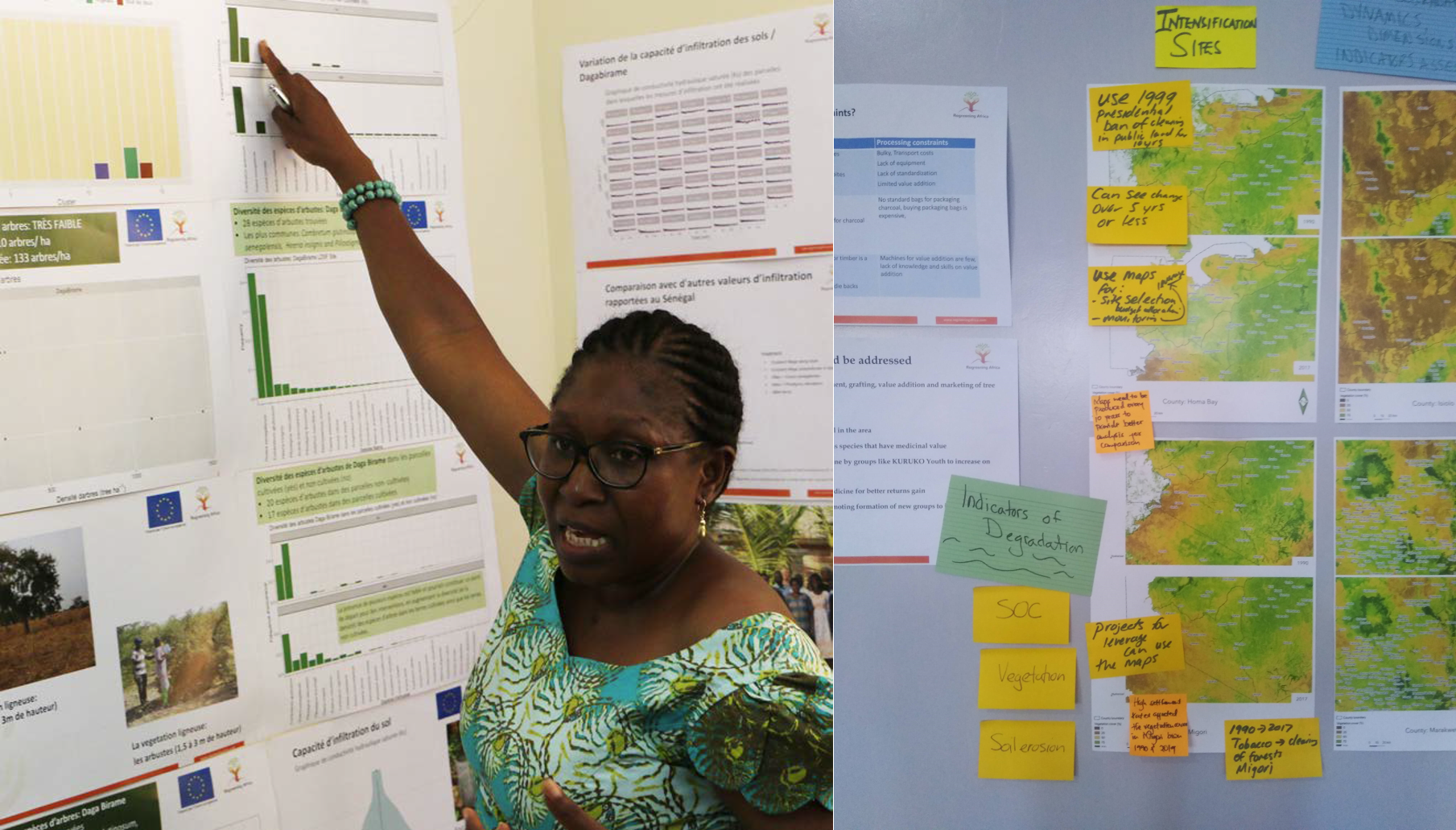
Collaborative conclusions
Given the intentional interaction with evidence and its implications, engagement with partners and stakeholders was enhanced and understanding of programmatic components broadened. Co-learning opportunities for revising strategies for on-ground and leveraged scaling were also created.
Outcomes of the JRLMs are already practically influencing the concrete next steps in the broader programme. For instance, all country teams put together informed annual activity plans and budgets, with component leads actively engaged in this process.
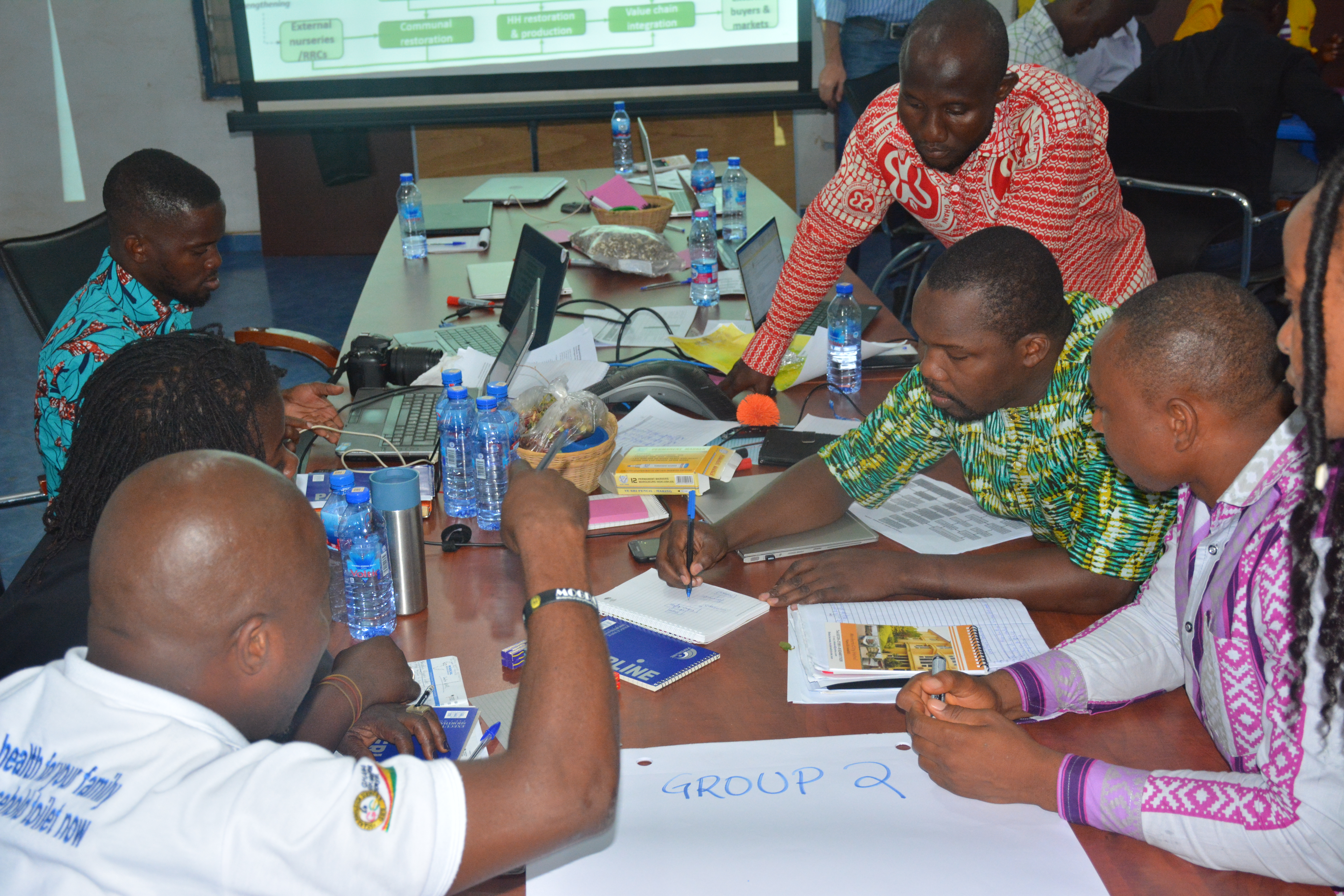
Participants of the JRLM discussing scaling in project implementation sites in Ghana. Photo by May Muthuri
Because of the innovative approach of the missions, Regreening Africa moves forward with greater team cohesion, targeted implementation and scaling efforts, and potential for impact.
To learn more about JRLM process and outputs, download the summary document at: http://worldagroforestry.org/output/joint-reflective-and-learning-missions-jrlm
Note: As a response to Covid-19 and the reduced international travel, SHARED will build on social capital that has been established within the project to date. This year, JRLMs will run virtually, with an emphasis on reflecting on evidence, both scientific and from the field, to adapt planning for Year 4.
Partners in the Regreening Africa project include: Agricultural and environmental ministries of the governments of Ethiopia, Ghana, Kenya, Mali, Niger, Rwanda, Senegal and Somalia, World Vision, CARE, Sahel Eco, Catholic Relief Services, Oxfam, Economics for Land Degradation and Global Evergreening Alliance.
This story was produced with the financial support of the European Union. Its contents are the sole responsibility of Regreening Africa and do not necessarily reflect the views of the European Union.

